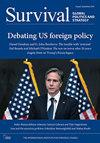Zeitenwende One Year On
IF 1.9
3区 社会学
Q2 INTERNATIONAL RELATIONS
引用次数: 0
Abstract
In response to Russia’s invasion of Ukraine on 24 February 2022, German Chancellor Olaf Scholz announced a Zeitenwende, or historical turning point, for German foreign and defence policy. Expectations of profound German geopolitical, geostrategic and geo-economic transformation were raised both in Germany and among Berlin’s allies. One year later, Germany’s greatest success has come in the geo-economic arena, where progress has been made to reduce Germany’s energy imports from Russia. Geopolitically, the picture is less convincing. While Scholz has committed to the defence of NATO territory against potential Russian aggression, it is not obvious whether the German government really perceives Russia as a direct threat to the country. Berlin has yet to formulate a convincing geopolitical leadership role in Europe, and it remains to be seen if the new defence minister, Boris Pistorius, will succeed in giving shape to much-needed Bundeswehr reform and resolve major readiness and procurement challenges. Consistent pressure from NATO allies will be needed to help bring about major change to Germany’s strategic and defence policy.一年过去了
作为对俄罗斯2022年2月24日入侵乌克兰的回应,德国总理奥拉夫·肖尔茨(Olaf Scholz)宣布了德国外交和国防政策的历史转折点。德国国内和盟国都对德国的地缘政治、地缘战略和地缘经济转型产生了深刻的期望。一年后,德国在地缘经济领域取得了最大的成功,在减少从俄罗斯进口能源方面取得了进展。从地缘政治角度来看,这幅图景不那么令人信服。尽管肖尔茨承诺保护北约领土免受俄罗斯的潜在侵略,但德国政府是否真的将俄罗斯视为对该国的直接威胁,目前尚不清楚。柏林尚未在欧洲确立一个令人信服的地缘政治领导角色,新任国防部长鲍里斯·皮斯托瑞斯(Boris Pistorius)能否成功推动亟需的联邦国防军改革,并解决主要的战备和采购挑战,还有待观察。北约盟国的持续施压将有助于德国的战略和国防政策发生重大变化。
本文章由计算机程序翻译,如有差异,请以英文原文为准。
求助全文
约1分钟内获得全文
求助全文
来源期刊

Survival
Multiple-
CiteScore
2.10
自引率
16.70%
发文量
88
期刊介绍:
Survival, the Institute"s bi-monthly journal, is a leading forum for analysis and debate of international and strategic affairs. With a diverse range of authors, thoughtful reviews and review essays, Survival is scholarly in depth while vivid, well-written and policy-relevant in approach. Shaped by its editors to be both timely and forward-thinking, the journal encourages writers to challenge conventional wisdom and bring fresh, often controversial, perspectives to bear on the strategic issues of the moment. Survival is essential reading for practitioners, analysts, teachers and followers of international affairs. Each issue also contains Book Reviews of the most important recent publications on international politics and security.
 求助内容:
求助内容: 应助结果提醒方式:
应助结果提醒方式:


